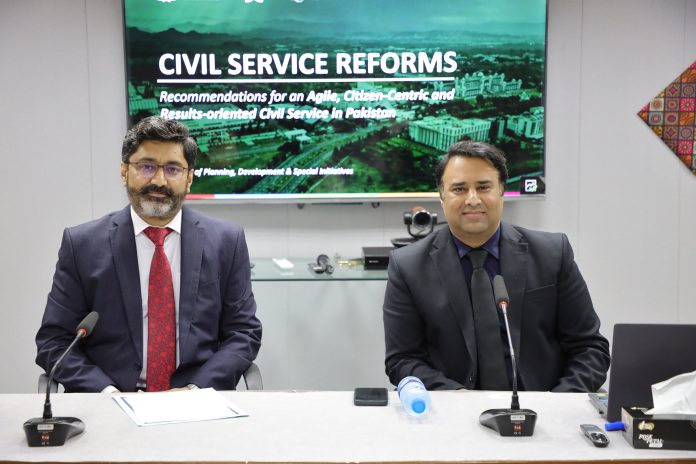ISLAMABAD, SEPT 11 (DNA):The Pakistan Institute of Development Economics (PIDE) organized a seminar on “Pakistan Governance Roadmap 2025: Civil Service Reform, Now or Never”, moderated by Dr. Faheem Jehangir (Dean Policy, PIDE & PD RASTA) and led by Dr. Adnan Rafiq, Member (Governance) at the Planning Commission of Pakistan. The event brought together policymakers, academics, and students to discuss the urgent need for transforming Pakistan’s governance system.
In his keynote, Dr. Rafiq declared that civil service reform is no longer optional but a survival imperative. Repeated reform efforts since the 1950s have stalled due to political resistance, bureaucratic inertia, and lack of continuity. Influenced by colonial-era practices and rapidly changing socio-economic requirements, technological penetration, and global disruptions, Pakistan’s bureaucracy needs an urgent upgradation. Led by the Federal Minister of Planning, Development, and Special Initiatives, Prof. Ahsan Iqbal, and the Member (Governance) at the Planning Commission of Pakistan, the speaker presented 47 recommendations for improving the institutional structure and practices of the civil service to enhance the efficiency and effectiveness of public service delivery.
He presented a comprehensive Pakistan Governance Roadmap 2025, which envisions a SMART civil service that is Specialized, Meritocratic, Accountable, Responsive, and Trusted. This shift would replace process compliance with measurable outcomes, domain expertise, and citizen-centric governance. The transformation is structured across five pillars: specialized recruitment exams focusing on critical thinking rather than rote memorization; competitive and advanced training linked to promotions; the creation of a National Executive Service (NES) for senior leadership positions with mandatory lateral entry from the private sector; performance management systems that tie individual goals to ministerial outcomes through KPI-based evaluations and multi-source feedback; and merit-linked compensation, promotions, and contributory pensions.
The roadmap also emphasizes institutional strengthening, including modernization of the Federal Public Service Commission through digital platforms and regional outreach, creation of specialized service groups in law, economics, energy, engineering, and planning, and professionalization of ministries through Human Resource Coordinators and Senior Executive Scales. It further highlights the importance of stronger federal–provincial coordination through revitalized forums and the empowerment of local governments with devolved authority, revenue mobilization, and inclusive elections to strengthen grassroots democracy.
Adopting STAR principles—Stable, Transparent, Agile, and Responsible governance—the roadmap also introduces sectoral reforms powered by digital transformation. Initiatives such as the Open PSDP portal, the National Job Portal, and climate-resilient recovery frameworks are designed to enhance transparency, inclusivity, and accountability, while promoting economic growth.
Dr. Rafiq argued for separate specialized functions of policy, regulations, and execution within the governance framework, and cautioned that adoption and implementation of SMART framework may face challenges, including deep-seated cultural resistance within bureaucracy and outdated financial and regulatory practices. He stressed that sustained political will and stakeholder consensus would be critical to ensuring continuity and success.
Concluding the seminar, Dr. Rafiq emphasized that reforms cannot remain on paper but must be owned, institutionalized, and consistently implemented. He reiterated that Pakistan’s future depends on building a civil service that is agile, citizen-serving, and performance-driven, and that’s what we observe from other successful examples abroad. The seminar ended with a resounding consensus: civil service reform is not just an option—it is a matter of national interest since Pakistan’s prosperity is linked to an efficient and competent civil service.

















